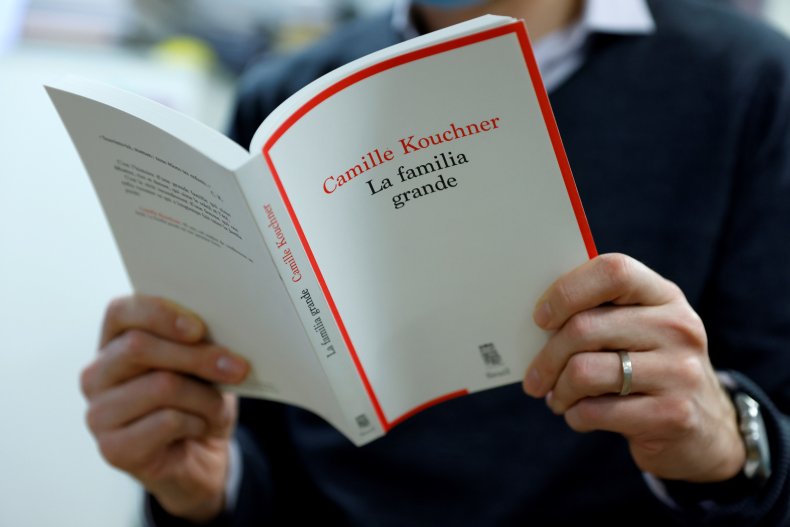[ad_1]
French survivors of incest shared their testimonies on social media using the hashtag #MeTooInceste after a prominent intellectual was accused of having sexually abused his stepson.
In a book titled La Familia Grande, lawyer Camille Kouchner alleged that her stepfather, high-profile political scientist Olivier Duhamel, routinely sexually abused her twin brother since he was 14 years old.
According to excerpts published by Le Nouvel Obs magazine, Kouchner recalled her brother—referred to as “Victor” in the book—confiding in her and begging for her silence, as their stepfather had allegedly instructed him to keep the abuse a secret.
“I was 14 and I allowed it to happen,” wrote Kouchner, the 45-year-old daughter of former foreign minister and Médecins Sans Frontières co-founder Bernard Kouchner and academic Evelyne Pisier. “I was 14 years old, I knew and I said nothing.”
In a statement to Le Monde newspaper, Kouchner’s brother said: “I confirm that what my sister wrote about Olivier Duhamel’s actions towards me are correct.”
Amid the ensuing controversy, Duhamel announced he was stepping down from his posts after being “targeted by personal attacks.” Up until that point, he had been president of the National Foundation for Political Sciences at Sciences Po university and a commentator on LCI television. Duhamel also hosted a weekly show on Europe 1 radio.
On January 5, the Paris prosecutor opened an investigation into allegations of “rapes and sexual abuses” against Duhamel.
According to France Culture radio, La Familia Grande became the best-selling non-fiction book in France as of Sunday. Excerpts of Kouchner’s book were published by Le Monde and Le Nouvel Obs in the run-up to its much-anticipated release on January 7.
Following the Duhamel scandal, hundreds of French Twitter users detailed their own experiences using the hashtag #MeTooInceste in an effort to dissolve taboos surrounding incestuous sexual violence.
“He was my ‘father,'” one Twitter user wrote. “I was 4 years old the first time. He continued for 12 long and painful years.”
“I was 13, him 26. He was my uncle,” tweeted another. “The judiciary condemned him to a one year suspended sentence. He is now an agile coach […], father to a 13-year-old little girl and living his best life.”
“I was six years old when the touching started, 15 when I had to live maritally with my father, be prostituted and raped on his order, 16 when I had to abort his work, 17 when I denounced him and was rejected by the family,” read a viral tweet.
“I was between 11 and 14 years old. It was my brother. I’m 57 years old and I am still a victim of this past,” a user testified.
According to a November survey conducted by market research firm Ipsos for French organization Face à l’inceste, one out of 10 people in France reported being survivors of incest.
While France was not exempt from a #MeToo reckoning, the issue remains debated between advocates for a movement seeking accountability and critics believing it to inhibit sexual freedom in the country.
After parting ways with Duhamel, LCI dropped philosopher Alain Finkielkraut as a commentator over his remarks on Kouchner’s allegations during a television appearance.
When the show’s host mentioned the alleged crime was committed against a “14-year-old child,” Finkielkraut retorted: “He’s a teenager, it’s not the same thing. To specify the crime, one must know whether there was any consent or not.”
The Duhamel scandal echoes a similar controversy that rattled France a year ago. Acclaimed French writer Gabriel Matzneff found himself under official investigation after publishing director Vanessa Springora wrote Le Consentement, a memoir in which she alleged Matzneff—then in his 50s—began grooming her when she was 14 years old.
A favorite of France’s literary elite, Matzneff, now 84, had for decades written brazenly about his pedophilia and sexual abuse of minors. Springora’s book was hailed as a catalyst for much-overdue scrutiny the writer had evaded with relative ease.
#MeTooInceste is currently trending in #France. Victims of incest are sharing their stories. It is heartbreaking and really tough to read these stories. I can only hope that justice will be served. Lots of love, respect and support to the victims.
— Rim-Sarah Alouane (@RimSarah) January 16, 2021

THOMAS SAMSON/AFP via Getty Images
[ad_2]
Source link